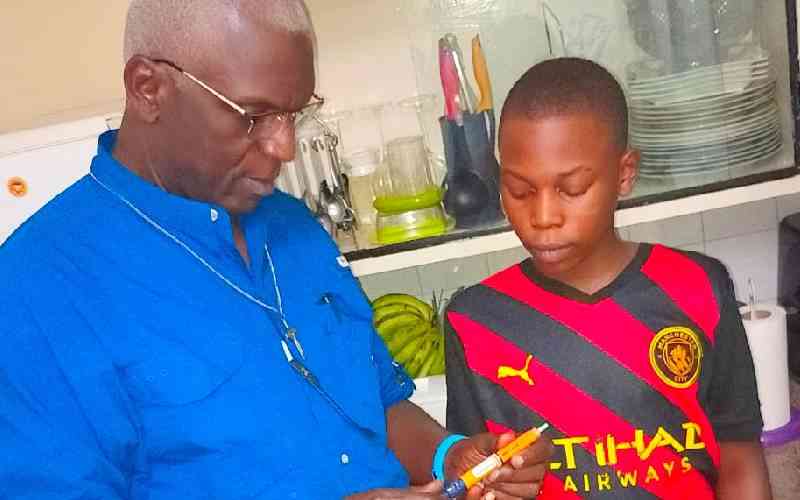
Do not look at the clock; do what it does. Keep going. These words define the life of a Kenyan scientist with a passion for research on the link between animal-human disease.
Around the world, people drink milk from cows, camels, goats and sheep. Dr Kariuki Njenga’s recent research is on this beverage consumed as a source of nutrition and with a team of researchers; he is investigating the handling and consumption of milk in Kajiado, Marsabit and Kiambu counties.
He explores the occurrence of brucellosis, a bacterial infection transmitted from animals to man through contaminated milk. The disease is known in Kiswahili as ‘ugonjwa ya maziwa.’
Njenga led a team of researchers to establish the burden of brucellosis working on the assumption that areas around Kajiado and Marsabit would record more cases compared to Kiambu.
That the bacteria can survive in frozen unpasteurised products and other animal products has motivated Njenga and his team to create further awareness on the disease.
The Chief Research Officer at Kenya Medical Research Institute, says the team considered Kiambu a low-risk area because of it’s peri-urban environment where farmers keep fewer livestock on zero-grazing whereas Kajiado and Marsabit had been rated as high risk due to widely practised pastoralism and the land tenure is mainly communal with little crop farming.
Njenga further pointed out that the three counties did not have routine vaccinations for livestock thus they collected specimens from man and animals to check for brucellosis.
However, findings showed Marsabit was the most affected, with at least one in seven households having a kin affected which was attributed to the breeds of livestock reared.
Njenga says the high occurrence of the disease in this area was fuelled by consumption of raw camel milk and was also common among persons who work with hide and skin and called for safety measures.
Who is he and what motivates him to create new knowledge otherwise known as research?
“I do not know a greater purpose than what I do,” Njenga who has written 135 peer reviewed articles, says.
He says his passion lies in research and is motivated by the drive to improve human health by understanding the link with the animal world.
Njenga has also researched on influenza and was involved when influenza HIN1 was a global threat and participated in advising Kenya to isolate those who had travelled and contracted the disease.
“Through active surveillance, we detected and isolated those with this particular flu within a week, no deaths were reported,” he says terming it a successful undertaking.
Njenga has no kind words for local research institutions for failure to translate work at the tertiary institutions to viable research programmes that can attract funding.
He argues that the government should allocate more monies for research.
“If you look at US and Europe, investing in research has resulted in innovations that are a key contributor to economic growth,” he says.
Public health threats
“Our universities do not nurture young scientists to publish their findings and give grants to fund their research. Most of our professors have weak research records, in part due to inadequate research programmes in our universities too,” he adds.
Between 1980 and 1985, he studied at University of Nairobi for a Bachelor of Veterinary Medicine before he enrolled for Master of Science.
In 1994 he was admitted to The Pennsylvania State University in the US for a Doctorate before he took up a postdoctoral Fellowship at the Mayo Clinic and Foundation in Rochester, Minnesota.
Privileged to have studied in top notch academic institutions globally including additional training as a virologist, Njenga returned home to nurture young Kenyans after working for Centre for Disease Control (CDC) and Prevention in Kenya coordinating all laboratories.
In his most recent posting as Director One Health Programme at the CDC Kenya that ended in 2014, one of his key goals was to appreciate that the health of humans is connected to the health of animals and the environment and worked with physicians, ecologists, and veterinarians to monitor and control public health threats.
Born in Trans Nzoia District, young Njenga lived with his family in Uganda before returning to Kenya and remembers times spending time with his grandfather as he attended Kedurumu Primary School near Bahati Forest, Nakuru.
Being the first born in a family of nine, responsibility came early and especially because his father was a peasant farmer, he picked up being a pace setter to his siblings. Some of the most powerful words that came from his father and continue to impact his adulthood, “If you have no dream, you have no chance of succeeding.”
And he learnt to dream, no matter how wild they became. This ambition saw him work in the US for 15 years before returning home to be part of home grown research that provides solutions to Kenya and to nurture young scholars.
He traces his turning point towards becoming a scholar early on during his Bachelor in Veterinary Medicine and Surgery degree training, to interactions with Prof Philip Nyaga from the University Of Nairobi Department Of Veterinary Pathology who sparked his investigation skills.
“Prof Nyaga taught me that a virus may be small but they disrupt and sometimes end the lives of human beings thus we should strive to understand them for our wellness and survival,” Njenga says.
In second year, he made up his mind to become a microbiologist to understand viruses better and on his return home in 2004, he began working on better management of Rift Valley Fever which affected Uganda, Tanzania and Kenya, and this affirmed his passion to work find a homespun solution.
Njenga says there have been more illnesses in the last ten years originating from animals to humans due to an increase in human population thus disturbing the animals’ abode. “We are getting closer to where the animals live longer than we did before thus some of these viruses find their way into the human environments,” he said.
And with the 2009 national census showing that Kenya has about 65 million livestock there should be concerted efforts to address animal health issues because they affect the quality of human life too, Njenga further noted.
A zoonotic disease is passed between animals and humans by viruses, bacteria, parasites, and fungi with animal experts estimating that more than six out of every ten infectious diseases in humans are spread from animals.
“Diseases transmitted from animals to humans include H1N1 influenza whose source was pigs, MERS –COV which refers to Middle East Respiratory Syndrome-Corona Virus which was a new virus reported in camels and H5N1 which came from wild bird, all classified as re-emerging diseases because they change their severity,” said Njenga.
He also calls on experts to understand the rainfall patterns because Rift Valley Fever outbreaks are associated with above normal rainfall and flooding which is a conducive environment for vectors that transmit the virus.
 The Standard Group Plc is a multi-media organization with investments in media
platforms spanning newspaper print
operations, television, radio broadcasting, digital and online services. The
Standard Group is recognized as a
leading multi-media house in Kenya with a key influence in matters of national
and international interest.
The Standard Group Plc is a multi-media organization with investments in media
platforms spanning newspaper print
operations, television, radio broadcasting, digital and online services. The
Standard Group is recognized as a
leading multi-media house in Kenya with a key influence in matters of national
and international interest.











